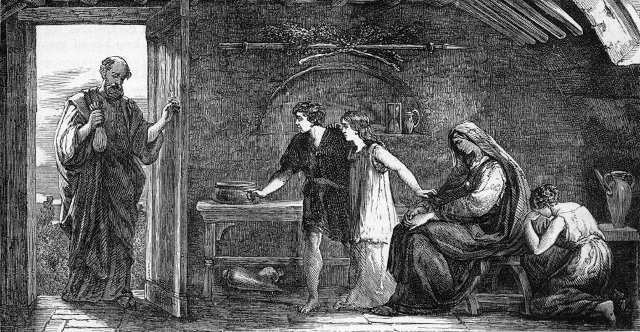
1
F
or every high priest chosen from among men is appointed to act on behalf of men in things relating to God, to offer both gifts and sacrifices for sins.
Porque todo sumo sacerdote tomado de entre los hombres es constituido a favor de los hombres en las cosas que a Dios se refieren, para presentar ofrendas y sacrificios por los pecados.
2
H
e is able to exercise gentleness and forbearance toward the ignorant and erring, since he himself also is liable to moral weakness and physical infirmity.
Puede obrar con benignidad (compasión) para con los ignorantes y extraviados, puesto que él mismo está sujeto a flaquezas.
3
A
nd because of this he is obliged to offer sacrifice for his own sins, as well as for those of the people.
Por esa causa está obligado a ofrecer sacrificios por los pecados, tanto por sí mismo como por el pueblo.
4
B
esides, one does not appropriate for himself the honor, but he is called by God and receives it of Him, just as Aaron did.
Nadie toma este honor para sí mismo, sino que lo recibe cuando es llamado por Dios, así como lo fue Aarón.
5
S
o too Christ (the Messiah) did not exalt Himself to be made a high priest, but was appointed and exalted by Him Who said to Him, You are My Son; today I have begotten You;
De la misma manera, Cristo no se glorificó a El mismo para hacerse Sumo Sacerdote, sino que Lo glorificó el que Le dijo: “ Hijo Mio eres Tu, Yo Te he engendrado hoy;”
6
A
s He says also in another place, You are a Priest forever after the order (with the rank) of Melchizedek.
como también dice en otro pasaje: “ Tu eres sacerdote para siempre segun el orden de Melquisedec.”
7
I
n the days of His flesh offered up definite, special petitions '> but needed] and supplications with strong crying and tears to Him Who was able to save Him from death, and He was heard because of His reverence toward God '> in that He shrank from the horrors of separation from the bright presence of the Father].
Cristo, en los días de Su carne, habiendo ofrecido oraciones y súplicas con gran clamor y lágrimas al que Lo podía librar de la muerte, fue oído a causa de Su temor reverente.
8
A
lthough He was a Son, He learned obedience through what He suffered
Aunque era Hijo, aprendió obediencia por lo que padeció;
9
A
nd, making Him perfectly, He became the Author and Source of eternal salvation to all those who give heed and obey Him,
y habiendo sido hecho perfecto, vino a ser fuente (autor) de eterna salvación para todos los que Le obedecen,
10
B
eing designated and recognized and saluted by God as High Priest after the order (with the rank) of Melchizedek.
siendo constituido por Dios como sumo sacerdote según el orden de Melquisedec. Crecimiento en la Madurez Espiritual
11
C
oncerning this we have much to say which is hard to explain, since you have become dull in your hearing and sluggish '> slothful in achieving spiritual insight].
Acerca de esto tenemos mucho que decir, y es difícil de explicar, puesto que ustedes se han hecho tardos para oír.
12
F
or even though by this time you ought to be teaching others, you actually need someone to teach you over again the very first principles of God’s Word. You have come to need milk, not solid food.
Pues aunque ya debieran ser maestros, otra vez tienen necesidad de que alguien les enseñe los principios elementales de los oráculos (las palabras) de Dios, y han llegado a tener necesidad de leche y no de alimento sólido.
13
F
or everyone who continues to feed on milk is obviously inexperienced and unskilled in the doctrine of righteousness (of conformity to the divine will in purpose, thought, and action), for he is a mere infant!
Porque todo el que toma sólo leche, no está acostumbrado a la palabra de justicia, porque es niño.
14
B
ut solid food is for full-grown men, for those whose senses and mental faculties are trained by practice to discriminate and distinguish between what is morally good and noble and what is evil and contrary either to divine or human law.
Pero el alimento sólido es para los adultos (los que han alcanzado madurez), los cuales por la práctica tienen los sentidos ejercitados para discernir el bien y el mal.
 English
English
 Albanian - Shqip
Albanian - Shqip
 Arabic - العربية
Arabic - العربية
 Bulgarian - Български
Bulgarian - Български
 Chinese - 汉语
Chinese - 汉语
 English - English
English - English
 French - Français
French - Français
 German - Deutsch
German - Deutsch
 Italian - Italiano
Italian - Italiano
 Māori - Te Reo Māori
Māori - Te Reo Māori
 Portuguese - Português
Portuguese - Português
 Romanian - Română
Romanian - Română
 Russian - Русский
Russian - Русский
 Somali - Af Soomaali
Somali - Af Soomaali
 Spanish - Español
Spanish - Español
 Ukrainian - Українська
Ukrainian - Українська
 Vietnamese - Tiêng Viêt
Vietnamese - Tiêng Viêt
 Spanish
Spanish
 Albanian - Shqip
Albanian - Shqip
 Arabic - العربية
Arabic - العربية
 Bulgarian - Български
Bulgarian - Български
 Chinese - 汉语
Chinese - 汉语
 English - English
English - English
 French - Français
French - Français
 German - Deutsch
German - Deutsch
 Italian - Italiano
Italian - Italiano
 Māori - Te Reo Māori
Māori - Te Reo Māori
 Portuguese - Português
Portuguese - Português
 Romanian - Română
Romanian - Română
 Russian - Русский
Russian - Русский
 Somali - Af Soomaali
Somali - Af Soomaali
 Spanish - Español
Spanish - Español
 Ukrainian - Українська
Ukrainian - Українська
 Vietnamese - Tiêng Viêt
Vietnamese - Tiêng Viêt
